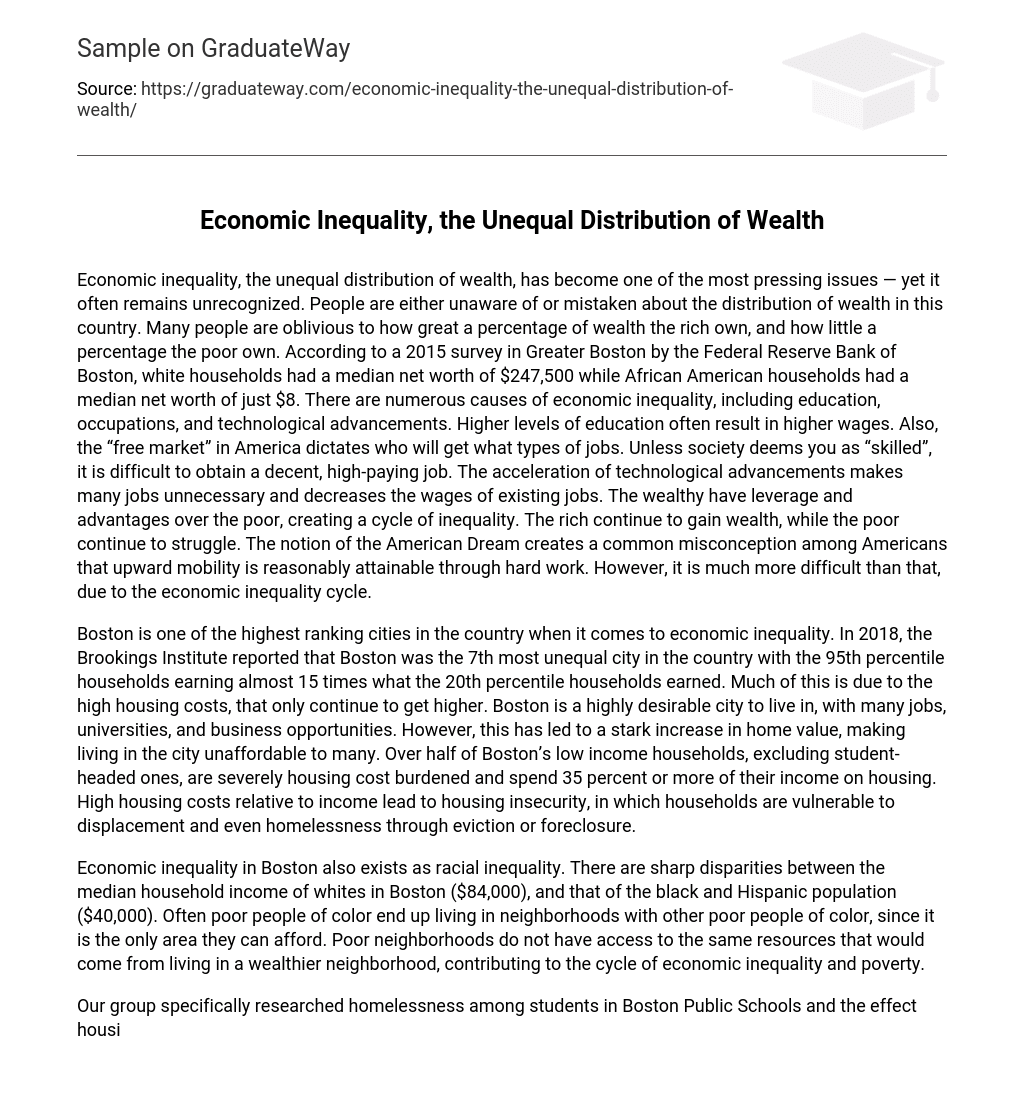Economic inequality, the unequal distribution of wealth, has become one of the most pressing issues — yet it often remains unrecognized. People are either unaware of or mistaken about the distribution of wealth in this country. Many people are oblivious to how great a percentage of wealth the rich own, and how little a percentage the poor own. According to a 2015 survey in Greater Boston by the Federal Reserve Bank of Boston, white households had a median net worth of $247,500 while African American households had a median net worth of just $8. There are numerous causes of economic inequality, including education, occupations, and technological advancements. Higher levels of education often result in higher wages. Also, the “free market” in America dictates who will get what types of jobs. Unless society deems you as “skilled”, it is difficult to obtain a decent, high-paying job. The acceleration of technological advancements makes many jobs unnecessary and decreases the wages of existing jobs. The wealthy have leverage and advantages over the poor, creating a cycle of inequality. The rich continue to gain wealth, while the poor continue to struggle. The notion of the American Dream creates a common misconception among Americans that upward mobility is reasonably attainable through hard work. However, it is much more difficult than that, due to the economic inequality cycle.
Boston is one of the highest ranking cities in the country when it comes to economic inequality. In 2018, the Brookings Institute reported that Boston was the 7th most unequal city in the country with the 95th percentile households earning almost 15 times what the 20th percentile households earned. Much of this is due to the high housing costs, that only continue to get higher. Boston is a highly desirable city to live in, with many jobs, universities, and business opportunities. However, this has led to a stark increase in home value, making living in the city unaffordable to many. Over half of Boston’s low income households, excluding student-headed ones, are severely housing cost burdened and spend 35 percent or more of their income on housing. High housing costs relative to income lead to housing insecurity, in which households are vulnerable to displacement and even homelessness through eviction or foreclosure.
Economic inequality in Boston also exists as racial inequality. There are sharp disparities between the median household income of whites in Boston ($84,000), and that of the black and Hispanic population ($40,000). Often poor people of color end up living in neighborhoods with other poor people of color, since it is the only area they can afford. Poor neighborhoods do not have access to the same resources that would come from living in a wealthier neighborhood, contributing to the cycle of economic inequality and poverty.
Our group specifically researched homelessness among students in Boston Public Schools and the effect housing insecurity has on academic performance. In an interview with Brian Marques, the Director of Opportunity Youth, we learned that BPS defines homeless students as those “who are ‘doubled up’, i.e. cohabiting a space with friends and/or family because they are unable to sustain stable housing on their own.” According to Marques, there are approximately 4,200 homeless students in BPS, 7.5 percent of the student body. We conducted a survey of BPS students, and got 105 responses. About 16 percent of the students who responded said that housing issues had impacted their achievement at school. Almost half of these students reported difficulties with getting to school on time. Other problems they reported were having to change schools due to moving, being unable to complete school assignments, being unable to participate in extracurricular activities, and lack of sleep (specifically due to housing situation). We also conducted a survey of teachers and guidance counselors. Through them, we learned that homeless students often face instability, trauma, and a sense of shame, all of which can affect their academic performance.
Through our surveys and interviews we sought to understand both the problems that homeless students face and action steps that the City and the school community can take to help address these challenges. In our interviews with BLS Assistant Headmaster Mr. Mulhern and guidance counselor Ms. Encarnacao, both described that low income and homeless students are always in need of more basic living necessities. In order to help these students, they suggested holding more drives to collect items such as clothes, food, and hygiene products. To do this, BLS could organize a club that holds these drives and gathers donations. Another way to help the students who lack basic resources is to make peer mentoring a priority, and perhaps create a peer tutoring group for homeless students. Mr. Mulhern and Ms. Encarnacao also expressed their concern about homeless students having adequate access to technology in order to do their schoolwork. BLS could combat this problem by leaving the library open longer, so that students have more access to computers and a safe and quiet work space. Additionally, BLS could invest in buying more Chromebooks that students in need can borrow.
On a broader scale, eradicating economic inequality in America has to start by changing people’s understanding of the American “meritocracy”. When people believe that America is a true meritocracy, they are mistaken. The truth is, the rich remain at the top and the poor remain at the bottom. Dismantling the idea that anyone can promote their own social and economic status just by the basis of hard work will promote the expansion of societal programs to assist economic mobility.





